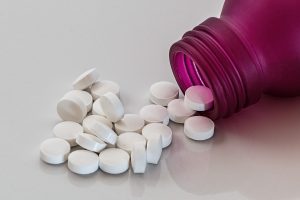Your body is full of bacteria, but it’s not all bad. Literally. Whilst research is lacking and the role of both bacteria and probiotics remain highly contested, belief in their importance is becoming more widely accepted.
The Problem With Imbalances
There several types of gut flora (‘flora’ being a far more pleasant sounding word than bacteria!) with two of the most well-known types being Bifidus Regularis and Lactobacillus acidophilus. Probiotics are live bacteria and yeasts that are naturally occurring within your body, but because the balance of bacteria can be easily disrupted, people are increasingly turning towards foods and supplements to increase their population within their bodies. It’s worth noting here the difference between pre- and probiotics. To keep it simple, probiotics are the good things you need, and prebiotics nourish them like a food source would.
A bacterial imbalance could be either :
- A result of too much bad bacteria – For instance, SIBO (small intestinal bacterial overgrowth) which may be detected by a hydrogen breath test often requires antibiotics, such as Rifaximin, along with probiotics.
- A result of low levels of good bacteria – This requires their replenishment via probiotics and may be due to antibiotics, which kill bacteria regardless of whether it’s good or bad.
You may not find a cause for the balance, or get a firm diagnosis. What’s more, the symptoms often associated with disrupted flora overlap with various condition. If left untreated, symptoms can problems can range from initial gut symptoms, headaches, depression, malabsorption of vitamins and minerals, pain and bloating, to conditions such as Leaky Gut syndrome.
Even Up The Scales – How to restore imbalances. There are three main options here.
1. Diet
Some claim a varied diet can improve gut bacteria, with the likes of bananas, blueberries and bananas introducing (probiotic) and nurturing (prebiotic) good bacteria. One of the more recent ‘fads’ is the FODMAP diet, which receives more backing from specialists. This focuses on fermented foods, using the belief that the bad stuff feeds off carbohydrates. It’s worth keeping in mind that everyone is different, so whilst a varied, fresh and natural diet, or even fermented foods, can sound very much like common sense goodness, they can trigger rather than soothe some tums.
2. Probio Drinks & Yoghurts
Remember seeing ads on TV and in magazines for drinks and yoghurts with ‘good bacteria’ to help your digestive system? More recent research has begun to discredit and debunk a lot of these fads, on the basis that the quality and quantity of the good bacteria is too low, or that it simply doesn’t survive your stomach acid to actually get to your gut. Personally, I think such products are a bit of a con. They sell well because people want to believe they can help their health and the companies keep dishing out the ads because the products are ludicrously overpriced!
Keep this in mind : Globally, the probiotic market is estimated to be worth around $20 billion. If you want to spend your money wisely, is there another way?
3. Supplements
You may therefore be better off considering a sachet of high strength probiotics, such as VSL#3, which at one point used to be prescribed by gastroenterologists. This will now set you back some pretty pennies. The alternative is a tablet format, but it’s worth shopping around for a better value buy as they can vary considerably in their quality, quantity and price. I’ll cover a recommendation in separate post soon.

Many people have reported benefits from antibiotics to reduce bad bacteria (where necessary), and probiotics to increase the good stuff. I’m a bit of a sceptic, however I must admit that I have found some benefit myself, but perhaps to a much lesser degree than some. Everyone is different, and trying them over a few months should give you an idea as to whether they can help you. There are some tempting research findings and stories from others about the impact supplements have had on their wellbeing.

